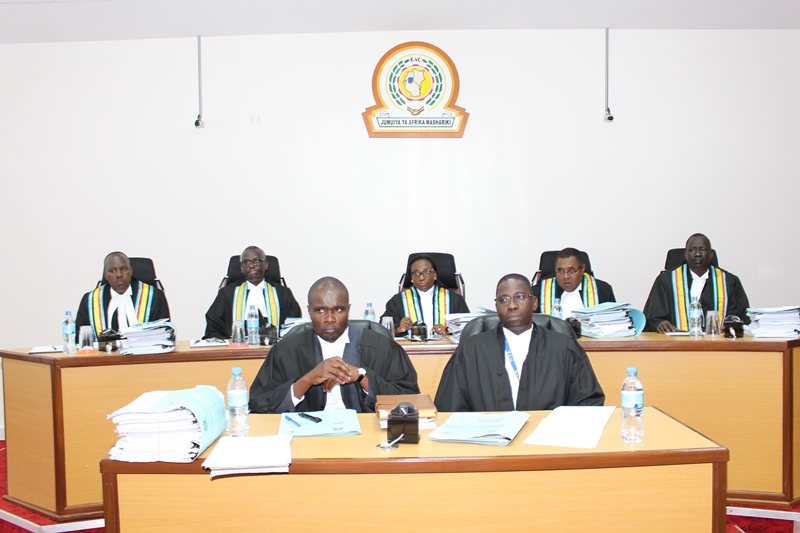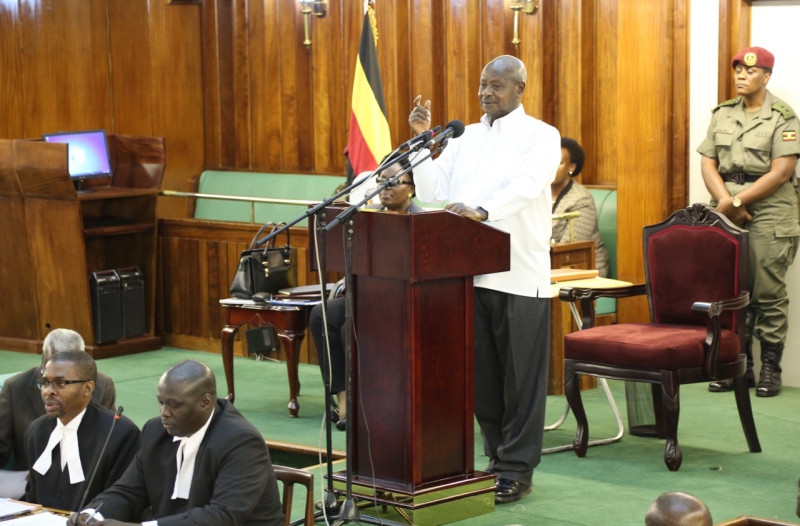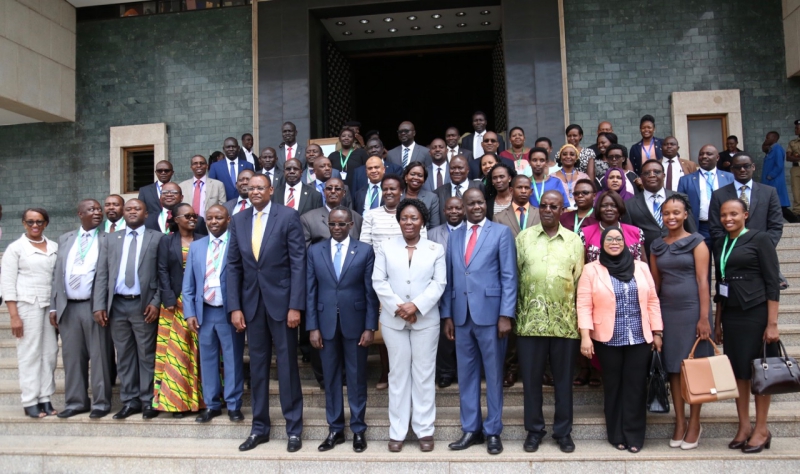
Court Hears an Application by Attorney General Rwanda Seeking to Strike Out the 2nd Pleadings Amendments in the Union Trade Centre Dispute
East African Court of Justice, Arusha, 25th January, 2017;
The First Instance Division heard an application filed by the Attorney General of the Republic of Rwanda (Applicant) against the Union Trade Centre (UTC, Respondent) over the amended pleadings that introduce a new cause of action in the Reference No. 10 of 2013 (the main case).
The case challenges the government of Rwanda over an allegation of appropriating the private property of UTC Mall as an infringement of the Treaty for the Establishment of the East African Community.
In his submission, Mr. Nicholas Ntarugera, representing the Attorney General of Rwanda, said that the Application was filed on the grounds that, the Applicant (AG Rwanda) found that under the cover of amending the Reference that was granted to the Respondent (UTC), by the Court on 15th November, 2017, instead of amending the Reference, the Respondent filed a new Reference by introducing a new cause of action of where the Rwanda Revenue Authority (RRA) auctioned/ sold the UTC Mall to another private company on 27th September, 2017, due to unpaid taxes that had accumulated.
Mr. Ntarugera further submitted that the Reference has been on record of the Court since 22 November, 2013, that the matter in question or complained of was that, this Court declared that the action of Nyarugenge District Commission in charge of management of the abandoned property, for taking over and managing the UTC Mall contravened Articles 5 (2) (g), 5 (3)(g), 6(d) 7(1) and others of the Treaty. He also said that the first Cause of action a rose on 27th July, 2013 when the Commission addressed a letter to the tenants who occupied the Mall.
Mr. Ntarugera added that, when the Respondent was granted leave to amend the pleadings, he violated the principles of amending the pleadings, whereby the Respondent filed a new cause of action. He further argued that the 2nd amended Reference is composed of two (2) causes of action that arose on different periods of time, by different bodies and on different grounds. He went ahead and explained that the 2nd cause of action a rose after four (4) years when the Reference was already before the Court.
Mr. Ntarugera added that the acts of the UTC had introduced new causes of action in the matter and that AG Rwanda finds it as an abuse of the Procedures of the Court.
Mr. Ntarugera further said that at the moment the UTC Mall neither belonged to UTC nor was the Nyarugenge District Commission in charge of the abandoned property, on grounds that it had been auctioned by RRA to another private Company. He further added that the RRA was an independent institution that can sue and be sued in its name and not through the AG Rwanda.
He further submitted that in the interest of Justice the Court cannot handle these two issues in the same Reference. “We find that the new cause of action is totally a new Reference,” Ntarugera said.
While concluding his submissions, Mr. Ntarugera asked the Court to either fully strike out the amended Reference with costs or only strike out the new cause of action and proceeds with the already existing one before this court.
On the part of the Respondent (UTC), Mr. Isaac Bakayana, opposed the Application and submitted that, three (3) reasons support their objection. Mr. Bakayana argued that the AG consented to the amendments when the issue of auctioning the UTC Mall came in and that when it was brought before the Court in November 2017 requesting the Court to allow them to amend the pleadings, so that such, is taken into account. He added that the Attorney General heard the submissions and did not oppose the amendments and was aware of the facts seeking to be introduced.
Mr. Bakayana referred the Court to Rule 48 of the Court’s Rules of Procedure and stated that the rule mentioned permits the Court to allow any party to amend any pleadings in such a manner it may direct and when the matter of auctioning the mall came up, the court allowed UTC to amend their pleadings. Also, he submitted that rule 50 (c) of the EACJ Rules of procedure, allows to add or substitute anew cause of action if the new cause of action rises out of the same facts. “It’s therefore the Respondent’s contention that the government of Rwanda has appropriated private property,” submitted Mr. Bakayana.
Furthermore, Bakayana said that it has been the allegation since 2013 and therefore the fact of RRA selling of the property after the government had been taken to court for illegal taking over the mall and managing it, is a continuous of the allegation they are complaining against.
The Respondent argued that the Claimant has the right to his property and the right was violated since 2013 and the Attorney General is liable.
In his 3rd reason for opposing the Application, Mr. Bakayana submitted that the Attorney General has not demonstrated he will suffer if the amended pleadings are allowed to stand. He further said that the Applicant had sufficient time to address every allegation made in the amended Reference from 15th December, 2017 when he was served. But none was demonstrated and so it’s in their view that there are no sufficient reasons not to allow the amendments to stand and allow the parties to argue their case on merits.
He also argued on the fact that the Appellate Division sent back the matter to be heard de novo in the First Instance Division, adding that in his understanding it means that the matter be heard afresh because the evidence was not properly heard before Court and that, that is why the Court even allowed interveners in the Reference. He finally asked court to reject the Application because it has no merit.
The Interveners represented by Mr. William Arnest Kivuyo, submitted that they have the views as the Applicant (Attorney General), that the new cause of action has been introduced and it contravenes the rule 50 (2) of the EACJ rules of procedure. He further said that, the issue of auctioning the UTC Mall was done by a different party RRA and done on a different dates.
Mr. Kivuyo stated that taking over and managing the property, the status and the shareholders did not change, only the management changed, but auctioning the property even the ownership changed. He therefore added that it cannot be treated as the same facts, hence a new cause of action.
In his conclusion, Mr Kivuyo, submitted that, it is the interveners’ belief that, auctioning of UTC changes their position and the fact that it is no longer the property of the previous shareholders, this calls for a new Reference all together. He therefore told court that the 2nd amendment introduces a new cause of action and contravenes the principles of law and should be struck out.
The matter was before a bench of the First Instance Division, comprised of Justices Monica Mugenyi (Principal Judge), Isaac Lenaola (Deputy Principal Judge), Justice Fakihi Jundu, Justice Audace Ngiye and Justice Dr. Charles Oyo Nyawello.
Notes to the Editors
Article 5 2 (g) of EAC Treaty states that; the enhancement and strengthening of partner ships with the private sector and civil society in order to a achieve sustainable socioeconomic and political development;
Rule 48 of EACJ Rules of procedure states that; For the purpose of determining the real question in controversy between the parties, or of correcting any defect or error in any pleading, a party may amend its pleading.
Rule 50 1 (c) of EACJ Rules of procedure 2013 states that; where the amendment adds or substitutes a new cause of action if the new cause of action arises out of the same facts or substantially the same facts as a cause of action in respect of which relief has already been claimed by the party seeking leave in the same case.
Rule 50 (2) of EACJ Rules of procedure states that; The Court may, in the following circumstances, grant such leave to amend notwithstanding that any relevant period of limitation current at the date of instituting the case has expired, if it thinks it is just so to do:
For more information, please contact:
Yufnalis Okubo
Registrar
East African Court of Justice
Arusha, Tanzania
Tel: +255 27 2162149
mail: Okubo [at] eachq.org
www.eacj.org
About the East African Court of Justice:
The East African Court of Justice (EACJ or ‘the Court’), is one of the organs of the East African Community established under Article 9 of the Treaty for the Establishment of the East African Community. Established in November 2001, the Court’s major responsibility is to ensure the adherence to law in the interpretation and application of and compliance with the EAC Treaty.
Arusha is the temporary seat of the Court until the Summit determines its permanent seat. The Court’s sub-registries are located in the respective National Courts in the Partner States.

